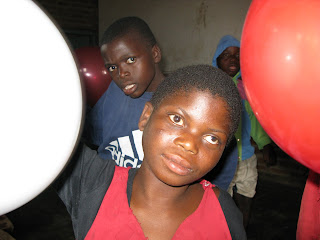
Neighbors gathered outside the house. Everyone was waiting to see. Women chattered and clucked in chichewa as they tried to catch a glimpse. Inside, Lucy chuckled and translated as we listened to the voices float in and mix with the dust and cobwebs. “The old woman is telling her neighbors, ‘I keep telling you to come with me to Bible study. Now look how the Lord has blessed me.” Villagers continued to gather to see what the commotion was all about. “Yesterday I sold only two bags of charcoal. I asked God, ‘How am I going to feed myself? How are you going to care for me?’ See how God has answered my prays. Let us remember to get down on our knees before we go begging.” Quiet smiles lined our faces as we listened to the chatter outside while inside we knocked down spider webs and sprinkled the floor with water to keep down the dust as we swept. I carried a bucket full with dirt, broken pieces of brick and bits of charcoal outside. The chatter stopped as they starred unbelievingly at the white woman working at an old black lady’s house. Drips of sweat streaked by face. I smiled at the crowd. All the women began talking at once. I emptied the bucket, waved and walked back inside.
For several weeks Lucy and I had been trying to arrange a date where we could go together to clean Agogo’s house (grandmother). Agogo is one of the widows who regularly joins us for the Widows’ Bible Study that meets on Monday mornings in the slum area of Chinupule. She is nearly 90, she thinks. She lives with her retarded son. All her other children have died. Her grandchildren live too far away. So, she cares for herself and her son, selling little bags of charcoal to local villagers to “make some business”.
There was not a piece of furniture in the house, only a few buckets of water for cooking and bathing, a bamboo matt and a torn blanket. On a pile of broken bricks and stones next to her bed lay a few torn peices of clothing. That is the extent of her belongings.
I grabbed the tub of water we had brought with us to clean. I emptied it into a bucket to finish mopping. “Look,” one of the neighbors cried, “She lifts like we do. She is strong like us”. Lucy laughed as she translated for me. I flexed a muscle and flashed a grin at them as I grabbed the bucket and disappeared back inside. They howled with laughter.
I found myself being grateful once again for lessons learned during childhood. My mother and father were both hard workers and always left a job well done. Never did I think though, that I would have the eyes of world (at least that's how it felt) watching me as I cleaned someone’s shack, someone's home. Its the little things you do that speak so loud to people.
We sat on the ground outside her house with a few of the remaining neighbors and some of our familiar friends from Bible Study who heard we were in town. Lucy brought her Bible and so we shared scripture, sang songs and then she asked me to give a closing message. I remembered the time the lawyer asked Jesus, “What must I do to inherit eternal life?” To love the Lord your God with all you heart, mind, strength and soul and to love your neighbor as yourself. I understand now why Jesus tells us that it is in doing this that we will inherit eternal life. The commandment is followed with the parable of the good Samaritan. When we love our neighbor and serve them as we would serve ourselves, we ironically become the broken man who is picked up by the side of the road and healed. It is in serving the least of these that we ourselves become served. never have I found cleaning so satisfying! For today, I inherited a bit of eternal life.



























